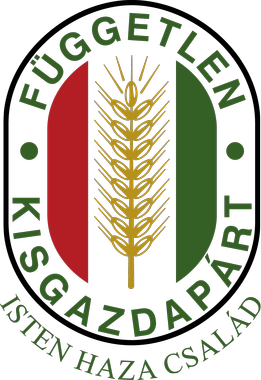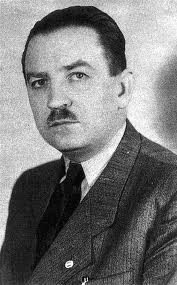
Imre Nagy was a Hungarian communist politician who served as Chairman of the Council of Ministers of the Hungarian People's Republic from 1953 to 1955. In 1956 Nagy became leader of the Hungarian Revolution of 1956 against the Soviet-backed government, for which he was sentenced to death and executed two years later. He was not related to previous agrarianist Prime Minister Ferenc Nagy.

The Hungarian Revolution of 1956, also known as the Hungarian Uprising, was an attempted countrywide revolution against the government of the Hungarian People's Republic (1949–1989) and the policies caused by the government's subordination to the Soviet Union (USSR). The uprising lasted 12 days before being crushed by Soviet tanks and troops on 4 November 1956. Thousands were killed and wounded and nearly a quarter of a million Hungarians fled the country.

Social Democracy, known as the Czech Social Democratic Party until 10 June 2023, is a social-democratic political party in the Czech Republic. Sitting on the centre-left of the political spectrum and holding pro-European views, it is a member of the Party of European Socialists, the Socialist International, and the Progressive Alliance. Masaryk Democratic Academy is the party-affiliated's think tank.

The Hungarian Democratic Forum was a centre-right political party in Hungary. It had a Hungarian nationalist, national-conservative, Christian-democratic ideology. The party was represented continuously in the National Assembly from the restoration of democracy in 1990 until 2010. It was dissolved on 8 April 2011.

Mátyás Rákosi was a Hungarian communist politician who was the de facto leader of Hungary from 1947 to 1956. He served first as General Secretary of the Hungarian Communist Party from 1945 to 1948 and then as General Secretary of the Hungarian Working People's Party from 1948 to 1956.

Zoltán Tildy, was an influential leader of Hungary, who served as prime minister from 1945 to 1946 and president from 1946 until 1948 in the post-war period before the seizure of power by Soviet-backed communists.

István Dobi was a Hungarian communist politician who was Prime Minister of Hungary from 1948 to 1952 and Chairman of the Presidential Council of the Hungarian People's Republic from 1952 to 1967.

Ferenc Nagy was a Hungarian politician of the Smallholders Party who served as Prime Minister of Hungary from 1946 until his forced resignation in 1947. He was also a Speaker of the National Assembly of Hungary and a member of the High National Council from 1945 to 1946. Nagy was the second democratically elected prime minister of Hungary, and would be the last until 1990 not to be a Communist or fellow traveler. The subsequent Hungarian prime minister Imre Nagy was unrelated to him.

The Independent Smallholders, Agrarian Workers and Civic Party, known mostly by its acronym FKgP or its shortened form Independent Smallholders' Party, is a political party in Budapest, Hungary. Since the 2002 parliamentary elections, the party has not won any seats.

The Social Democratic Party of Hungary is a social democratic political party in Hungary. Historically, the party was dissolved during the occupation of Hungary by Nazi Germany (1944–1945) and the communist period of Hungary from 1948 to 1989, after being forced into a merger with the Communist Party. It worked legally for a short time during the Revolution of 1956.

The Hungarian People's Republic was a one-party socialist state from 20 August 1949 to 23 October 1989. It was governed by the Hungarian Socialist Workers' Party, which was under the influence of the Soviet Union. Pursuant to the 1944 Moscow Conference, Winston Churchill and Joseph Stalin had agreed that after the war Hungary was to be included in the Soviet sphere of influence. The HPR remained in existence until 1989, when opposition forces brought the end of communism in Hungary.
The Left Bloc was a political alliance in Hungary, functioning between 1946 and 1947. The Bloc included the Hungarian Communist Party (MKP), the Social Democratic Party (SZDP), the National Peasant Party (NPP) and the Trade Union Council (SZT).
Parliamentary elections, which later became known as the "blue-ballot" elections, were held in Hungary on 31 August 1947. The Hungarian Communist Party, which had lost the previous election, consolidated its power in the interim using salami tactics. Communist-led political intrigues had deprived their opposition of its democratically won mandate from 1945, as numerous prominent anti-Communists were removed from office on charges of conspiracy. These conspiracies reached a climax in late May 1947, when the Hungarian Communist Party deposed the democratically elected prime minister Ferenc Nagy in a coup d'état, removing one of the strongest opponents to their rule and crippling the opposition. This weakening of the opposition, combined with a revised electoral law, led to further Communist gains. This would be the last remotely competitive election held in Hungary until 1990.

The Second Hungarian Republic was a parliamentary republic briefly established after the disestablishment of the Kingdom of Hungary on 1 February 1946. It was itself dissolved on 20 August 1949 and succeeded by the Soviet-backed Hungarian People's Republic.

Rezső Nyers was a Hungarian politician who served as Minister of Finance of Hungary from 1960 to 1962. For a few months in 1989, he was the country's last Communist leader.

In the May 1947 crises, also referred to as the exclusion crises, the Communists were excluded from government in Italy and France. The crises contributed to the start of the Cold War in Western Europe.

Antal Apró was a Hungarian Communist politician, who served as Speaker of the National Assembly of Hungary between 1971 and 1984.

Béla Kovács was a Hungarian politician, who served as Minister of Agriculture from 1945 to 1946 and in the Hungarian Revolution of 1956.
Imre Nagy first became Chairman of the Council of Ministers of the Hungarian People's Republic on 4 July 1953 upon the resignation of Mátyás Rákosi, forming a government more moderate than that of his predecessor which attempted to reform the system. However, Rákosi remained First Secretary of the ruling Hungarian Working People's Party, and he was ultimately able to use his influence to force Nagy out of office in April 1955.






















